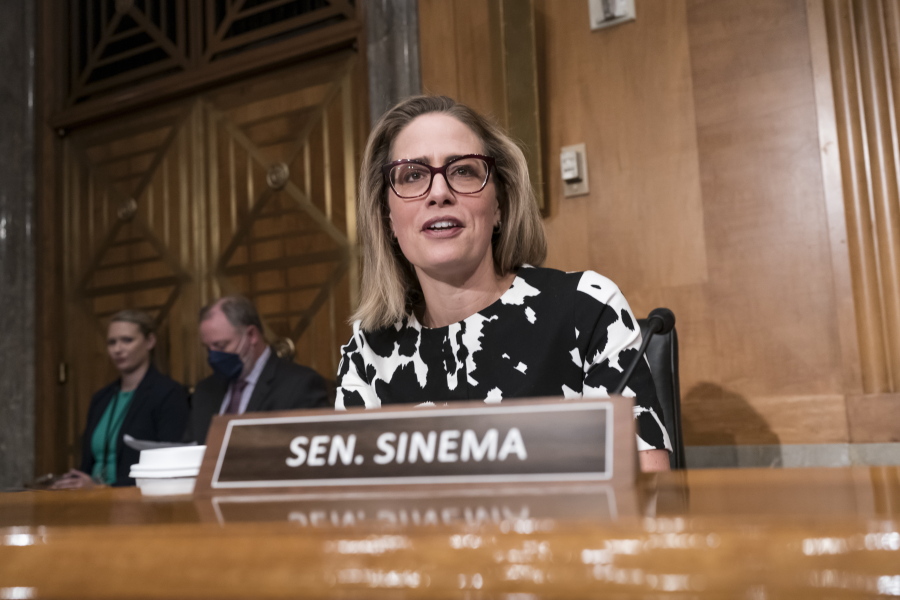WASHINGTON — Republicans see inflation, taxes and immigration as Democratic weak spots worth attacking, and two opposition senators as prime targets, in the upcoming battle over an economic package the Democrats want to push through the Senate.
The measure embodies some of the top environment, energy, health care and tax policy aspirations that President Joe Biden and party leaders want to enact as voters start tuning in to this fall’s congressional elections. The GOP would like to derail the measure, or at least force Democrats to take votes that would be painful to defend in reelection campaigns.
Republicans are already aiming fire at Sen. Joe Manchin, D-W.Va., who crafted the measure with Senate Majority Leader Chuck Schumer, D-N.Y., and unexpectedly pumped life into an effort most Democrats considered moribund. Manchin is a conservative Democrat from a deep red state who has scuttled his party’s priorities before, and Republicans have savaged him in recent days, an unsubtle signal that they’ll be coming for him should he seek reelection in 2024.
“He made a terrible deal,” Senate Minority Leader Mitch McConnell, R-Ky., told reporters this week. “How he can defend this from a West Virginia point of view, or think of it as a centrist type of agreement, is astonishing. This is an agreement only Bernie Sanders would love.”
Even Sen. Shelley Moore Capito, R-W.Va., who has a strong relationship with Manchin and seldom clashes with him publicly, lambasted the legislation for imposing a minimum tax on huge, profitable corporations that she said would hinder investments. “Like many West Virginians, I’m concerned that this tax increase will delay closing the digital divide” in rural communities, she said.
Republicans are taking a softer approach with Sen. Kyrsten Sinema, D-Ariz., who has been coy about the legislation and has shown concerns about tax increases. She’s her party’s biggest question mark on this bill in the 50-50 chamber, where all Republicans seem certain to vote “no,” and she’s held several discussions with GOP senators during votes this week.
Sinema has opposed past proposals to raise taxes on wealthy equity firm executives, which this time would raise around $14 billion of this legislation’s $739 billion in revenue. She met with Arizona manufacturers who oppose boosting the corporate minimum tax and thanked her afterward in a tweet for her “thoughtful approach & willingness to listen to AZ job creators.”
“I don’t know what she thinks,” Idaho Sen. Mike Crapo, top Republican on the Senate Finance Committee, told reporters. “‘We are making our case’ is the best we can say.”
The 10-year measure includes hundreds of billions in spending and tax breaks to encourage alternative energy production and to bolster fossil fuels with steps like tax breaks for technology that reduces carbon emissions. There’s also money to help people buy private health coverage, and provisions giving Medicare the power to negotiate prices on some drugs with pharmaceutical makers.
The bill “will lower costs, fight inflation, and secure historic wins in the fight against climate change,” Schumer said.
The GOP seems certain to try stripping or toning down the corporate minimum tax and language raising taxes on wealthy equity firm executives as well, and has hopes of winning over Sinema as the decisive vote for that. After she opposed Democrats’ proposed tax rate increases last year on corporations and high earners, they switched to a corporate minimum tax that she supported, but it is uncertain if she will do so now.
Republicans could fashion amendments aimed at particular Democratic senators — such as one exempting coal producers from certain taxes in a play for Manchin.
To buttress its argument, the GOP released an analysis by the nonpartisan Joint Committee on Taxation that Republicans said showed tax boosts for people earning below $400,000. That would violate Biden’s pledge to not boost levies on that income group.
“Ordinary Americans would bear a substantial part of the burden of this tax increase,” said No. 2 Senate GOP leader John Thune of South Dakota.



